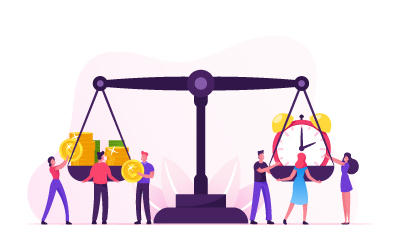 Contact
About Us
Articles
Home
Contact
About Us
Articles
Home

The CARES Act, a $2 trillion federal coronavirus relief initiative, has made it possible for Americans who are struggling financially to take money from their retirement savings accounts. The act allows eligible individuals to make a withdrawal of up to $100,000 from their retirement accounts without incurring a 10% early-withdrawal penalty if they are under 59½ years of age. The relief package also changes some of the rules that pertain to 401(k) loans.
Taking advantage of these changes may not be right for you. Here are the details to help you decide:
Qualifying individuals should fall into two primary categories:
A withdrawal is not the same as a loan in that it is a distribution from a qualified plan. Typically, any distribution is taxed in the year you receive it. Also, if you are under the age of 59½, you would have a 10% early withdrawal penalty assessed on the amount you withdrew.
Under the CARES Act, however, qualified participants can withdraw money from their plan — up to the $100,000 limit — without having to pay that 10% penalty. Also, paying the taxes on the withdrawal can be spread out over three years, and if you can replace the money within three years, you may file an amended return and recoup the taxes you paid on those distributions.
Loans work differently. Keep in mind that individual retirement accounts do not allow loans. Under the CARES Act, the amount qualified participants may borrow from a 401(k) is doubled from $50,000 to $100,000, or 100% of the participant's vested account balance if it's less than $100,000. The borrower won't owe income tax on the loan from the 401(k) as long as it's repaid within five years.
Anyone who qualifies under the CARES Act, and already has a 401(k) loan, may delay repayments due in 2020 for one year, even though interest will continue to accrue on those deferred payments.
Participants in 401(k) plans should check with their plan administrator since these new provisions under the CARES Act are optional. That means your plan isn't required to allow them even if they already offer hardship withdrawals or loans.
As with most financial matters, there is no blanket answer to cover every individual's situation. If your plan doesn't allow loans, then the decision has been made for you. If you have the option to take out a loan, in most cases, it will be the better choice.
Remember, however, that most financial advisors will caution you to explore all your options for getting through the crisis before you turn to your qualified plan for cash. You don't want to set yourself back in your retirement planning any more than you absolutely must.
Here are a few alternatives to tapping your retirement savings:
If you ultimately decide to take out a 401(k) loan, consider this:
The CARES Act gives you access to the lesser amount of $100,000 or 100 percent of the value of your plan. If you repay the loan in five years, no tax will be due until you take distributions at retirement.
Also, 401(k) loans are usually offered at competitive interest rates, which are linked to the prime rate. When compared to other forms of debt, such as personal loans and credit cards, they are almost always significantly lower.
Another benefit is that you are both the borrower and the lender, and you are paying yourself back with interest. If you must take out a loan, it's much better than paying back someone else. There are no processing or loan application fees, and the loans have few restrictions and no credit check. And if you can't repay the loan, it won't have the same impact on your credit as it would with a traditional loan.

There are only two notable disadvantages to a 401(k) loan, but they are significant drawbacks.
Reason #1: You are using money that should be working for you toward a comfortable retirement. Yes, you might be caught in a financial squeeze because of COVID-19, and you have no choice. But you need to be aware of what it costs you to miss out on the potential growth in your account.
For example, take the case of Julia, a 40-year-old worker in a manufacturing company. She's been laid off for a few weeks now with no idea when she'll see her next paycheck. As a single person, she only has unemployment compensation and a few hundred dollars in savings to get her through the crisis.
However, Julia has accumulated $100,000 in her employer's 401(k) plan and has decided to take out a $30,000 loan to pay off a car loan and other debts with some left over for her monthly bills. While this seems like a smart short-term solution, take a look at the impact it could have on her retirement 30 years in the future.
Julia's loan from the plan would have to be repaid in five years ($6,000 per year), so she will permanently lose five years of growth on at least parts of that $30,000. If she pays back $6,000 each year and continues to contribute that amount after the loan is repaid, she will have a balance of about $1,200,000 (at 7% average growth rate) when she turns 70 years of age.
But if Julia could ride out the storm and left her $100,000 balance to grow at an average 7% over the next 30 years, she would have accumulated $1,445,000 — that's $245,000 more – assuming she could add $6,000 each year without any matching funds from her employer.
And that leads to the next reason.
Reason #2: Another disadvantage (and maybe even the bigger of the two) is that you might not be able to pay back the loan. In Julia's case, she would be hit with a 10% early withdrawal penalty on the amount she failed to put back into her account. And that could mean tens of thousands of dollars that will not be there for her at retirement.
Granted, these are unusual times, and many of the old rules might not apply. But having a secure retirement means allowing your 401(k) to grow as much as possible, and anything that prevents it from doing that must be thought out carefully. If you must take out money, it's likely better if you do it with a loan. But the very best option will always be to leave it untouched.
Alliance America is an insurance and financial services company. Our financial planners and retirement income certified professionals can assist you in maximizing your retirement resources and help you to achieve your future goals. We have access to an array of products and services, all focused on helping you enjoy the retirement lifestyle you want and deserve. You can request a no-cost, no-obligation consultation by calling (833) 219-6884 today.


